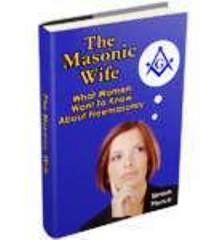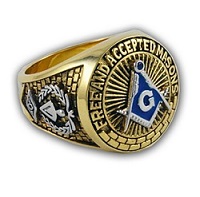Freemasonry and the Bible
Masonic Bibles In History

Freemasonry and the Bible...From the first Hebrew texts upon papyrus and leather scrolls, the Old Testament, as we know it, today, comes down to us, through the ages.
The Bible in the foreground of the picture, above, is a Geneva Bible from 1581. It is leather and tooled in gold.
Q: Why is a basic understanding of Bible genealogy important to a Freemason, today?
A: The reason is that Freemasonry has biblical foundations.
Q: Is a Freemason Bible any different than a regular Bible?
A: No.
The Bible (from the Greek word, biblia) is for all Christians the most sacred of books, the source of truth and the revelation of God's word. Throughout the millenniums (thousands of years), no other book has been reproduced and translated as many times as the Bible.
No original manuscripts are known to exist...only copies of copies and via the many translations, many errors have invariably crept in. Written some 3300 years ago (1300 B.C.-100 A.D.), the Bible continues to be, by far, the most popular of books.
Much of Freemasonry is based upon biblical scripture and biblical characters.
Foundations of Freemasonry and the Bible For
Christians, Freemasonry and the Bible are intricately connected
....just as the
Holy Books of other religions are central to their Freemason foundations.
The Creator: It is to the Supreme Architect of the Universe, our Creator, he of many names around the world, that each of us worship.
Masonic Symbols: Ark of the Covenant, the Mosaic Pavement, Jacob's Ladder, the Lambskin Apron, King Solomon's Temple and others.
Masonic Ritual Degree Verses: The 3 verses within the 3 Masonic Degrees of Entered Apprentice, Fellow Craft and Master Mason are direct quotes from the Bible.
Biblical Characters: King Solomon, Hiram Abif, Hiram of Tyre, Tubal Cain, St. John the Baptist, St. John the Evangelist, Jacob and Jacob's Ladder, etc. All are biblical characters.
Masonic Altar: The Masonic altar holds a Holy Book (or several Holy Books, depending upon the personal religions of its members). It is around this Holy book that Freemasons circumambulate in their attempts to perform acts pleasing to the Creator.
Masonic Charity: The origins of Masonic charity begin with The Good Samaritan. (Luke 10:25-37)
And so it is written that no man should ever engage in any important undertaking
without first invoking the aid and blessing of Deity.
The table, below, provides the Old Testament Bible
Genealogy of the most famous Hebrew, Greek, Latin and English Bible
translations.
Old Testament Bible Genealogy
| 1300-165 B.C. | First Hebrew texts set down on papyrus and leather scrolls |
| 250-50 B.C. | Septuagint - First translations from Hebrew to Greek |
| 7th-9th Centuries A.D. | Texts edited into present day form by Masoretes |
| 400 A.D. | St. Jerome's Vulgate - Latin translation. Catholic standard. |
| 1382 A.D. | Wycliffe's Bible. First English translation |
| 1455 A.D. | Guttenberg Bible. First printed Bible, using Vulgate text. |
| 1525-1530 A.D. | Tyndale Bible. First printed English translation from Hebrew texts. |
| 1539 A.D. | Great Bible. First English translation authorized by Church. |
| 1560 A.D. | Geneva Bible. Published by English exiles. Brought to America by Pilgrims. |
| 1582-1610 A.D. | Douay Bible. English translation for Catholics brought to America. |
| 1611 A.D. | King James Bible. Translated by 47 scholars. Most famous English Bible. |
| 1663 A.D. | Algonquin Bible. Translated for Indians. First Bible printed in America. |
| 1952 | Confraternity Bible. First U.S. Catholic versions entirely from basic Hebrew sources, including the Dead Sea Scrolls, discovered in 1947. These are the oldest available texts, some dating to 200 B.C. |
| 1952 | Revised Standard Version. Protestant Bible |
Freemasonry and the Bible
Many more Bible translations have been performed since 1952.
Freemasonry and the Bible go hand in hand, but throughout the centuries, different Bibles have been placed upon the Masonic altar. ..from the time of Freemasonry's Old Charges (1390 - 1714) and before, as well as to the current period.
While Holy Books from all languages reside upon the many
Masonic altars around the world, it is of note that for English speaking
Freemasons, whose Masonic lodge uses the Bible, the Bible of today is, like all
Bibles, a translated version of the original Hebrew texts.
Bible Translations
Septuagint
The Septuagint's name derives from the 72 Jewish scholars who translated the Hebrew to Greek. Their work was performed in Egypt.
It was necessary to translate the Hebrew to Greek because the Jewish people living in Egypt at the time, spoke and understood Greek, rather than Hebrew. This Greek translation was in use at the time of Jesus.
St. Jerome's Vulgate
The first rendering of the entire Bible into Latin was St. Jerome's Vulgate, a named deriving from vulgatus, meaning for common use.
For a thousand years, St. Jerome's was the only authoritative Bible in Western Europe, but, ironically, it was seldom read by the common people.
Wycliffe Bible
It is interesting to note that the Wycliffe Bible of 1382 was available close to the time in which the first of the Old Charges were written.
John Wycliffe was among the first of many Englishmen to incur the Church's wrath for producing unauthorized translations of the Scriptures, as well as for his heretical writings.
Gutenberg Bible
Johannes Gensfleisch Gutenberg, of Mainz, Germany created a printed version of the Latin Vulgate translation.
Gutenberg's Bible is the first book created using movable type. Previous to this time, Bibles were laboriously handwritten manuscripts.
Tyndale Bible
William Tyndale, another English translator who was persecuted by the Church, fled to the Low Countries, where he was strangled.
Great Bible
Also, of note, Henry VIII had copies of the Great Bible chained in order to foil overzealous worshippers.
Geneva Bible
The Geneva Bible was a Puritan version.
Douay Bible
The Douay Bible was translated in Douai and Rheims, France by Roman Catholics fleeing Queen Elizabeth. It has remained as a favorite of English-speaking Catholics.
King James Bible
The most popular version among Anglicans and Protestants has been the King James, whose grand style influenced all English prose.
Freemasonry and the Bible is, for Christian Freemasons, the foundation of its Masonic precepts, just as the Vedas, the, Qur'an, the Hebrew Bible and the Holy Scriptures of other religions are the foundation of their Masonic precepts.
The information on this Freemasonry and the Bible page is gratefully acknowledged and credit is given to The World's Greatest Religions, Time Inc. Life, Simon & Schuster, Inc., 1957.
Related Pages:
5 Fast Methods To Find the Information You Want to Learn About
- Search Box - Use the Search Box at the top of your page.
- Site Map - Use my Site Map page to find the topics you are most interested in.
- Carousel - Use the carousel of pages at the top of your screen.
- Menu Icon - On MOBILE, click the MENU button at the top of each page.
- Masonic Books - Browse through a selection of Masonic books.






